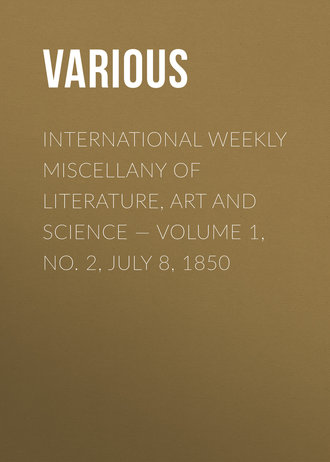
Various
International Weekly Miscellany of Literature, Art and Science — Volume 1, No. 2, July 8, 1850
CONCLUSION
There is great excitement in Dantzic, for the noble clock, which has been for ten years the marvel of Germany,—the clock which was made by the cunningest artificers who followed Dumiger's model, has stopped. No one can arrange it; the model was broken up as a jealous precaution. There is but one who understands it—who can regulate the wondrous movement; that is he who constructed it.
Yes. the Council will go to Dumiger. They seek his house; they repent of the fearful crime they committed.
"Dumiger, come forth!" they exclaim. "Forgive us our offense. Greatest of citizens, all honors and rewards shall be heaped upon you. Regulate this great work, prized above all others in this city, for which we contended for five years with Hamburg. Stand forth in glory and honor!"
And a man, young in years, but decrepit in suffering, appears, supported by two friends. The partner of his hopes and fears is long since dead. The streets ring with applause as he appears, and many kneel to kiss his hand—ay, some his feet. But all he asks is to be led first to Marguerite's grave. There, in the presence of thousands, he prays for strength; and then he desires them to conduct him to the clock-tower.
When he appears outside, the air is rent with shouts. "Dumiger, Dumiger, the first of the citizens!" Oh, popular feeling, at once base and baseless!
He seems to see the works again; he climbs up and touches every part of the wonderful construction—his hand has found the secret of the movement, again it is in order, and the pride of Dantzic is saved.
He stands still for some minutes. A god could not have been more worshiped, or a prophet looked grander. Again his hand is on the movement—crash, crash,—the slight spring on which the whole machinery depended is rent asunder by his own hand; the clock falls to pieces, never to be repaired. At the same moment there is a fall, a fearful groan, and Dumiger lies on the pavement a bleeding corpse. The clock and its maker have ceased to exist.
Such is the legend, and from that day there has been no clock in the Dom of Dantzic.
THE SHIP "EXTRAVAGANCE."
Oh, Extravagance saileth in climes bright and warm.
She is built for the sunlight and not for the storm;
Her anchor is gold, and her mainmast is pride—
Every sheet in the wind doth she dashingly ride!
But Content is a vessel not built for display,
Though she's ready and steady—come storm when it may.
So give us Content as life's channel we steer.
If our Pilot be Caution, we've little to fear!
Oh! Extravagance saileth 'mid glitter and show,
As if fortune's rich tide never ebbed in its flow;
But see her at night when her gold-light is spent,
When her anchor is lost, and her silken sails rent;
When the wave of destruction her shatter'd side drinks,
And the billows—ha! ha!—laugh and shout as she sinks.
No! give us Content, as life's channel we steer.
While our Pilot is Caution, there's little to fear.
—Charles Swain.
LAUGHING IN THE SLEEVE.—A writer in Notes and Queries gives an instance of Curry's wit, introduced after a defeat in a conversational contest with Lady Morgan. "It was the fashion then for ladies to wear very short sleeves; and Lady Morgan, albeit not a young woman, with true provincial exaggeration, wore none—a mere strap over her shoulders. Curry was walking away from her little coterie, when she called out, 'Ah! come back, Mr. Curry, and acknowledge that you are fairly beaten.' 'At any rate,' said he, turning round, 'I have this consolation, you can't laugh at me in your sleeve!"
An antiquarian discovery has just been made in Kremusch, near Treplitz, in Bohemia. Some twelve feet below the surface of the earth, a tomb, with six bodies in it, was found. It contained, besides, a gold chain about a yard and a half long, three gold ear-rings, two gold balls of the size of a walnut, a gold medallion with a cameo representing a Roman Emperor, and an iron plate, thickly silvered, on each side of which is engraved a reindeer, with a hawk on its hind quarters. The workmanship of the different objects, which evidently belong to the ante-Christian era, is remarkable for its neatness.
DEATH
"Death is a road our dearest friends have gone;
Why, with such leaders, fear to say 'Lead on?'
Its gate repels, lest it too soon be tried;
But turns in balm on the immortal side.
Mothers have pass'd it; fathers; children: men,
Whose like we look not to behold again;
Women, that smiled away their loving breath.—
Soft is the traveling on the road of Death.
But guilt has passed it? Men not fit to die?
Oh, hush—for He that made us all, is by.
Human were all; all men; all born of mothers;
All our own selves, in the worn-out shape of others;
Our used, and oh! be sure, not to be ill-used brothers."
—Leigh Hunt.
So perfect were the Egyptians in the manufacture of perfumes that some of their ancient ointment, preserved in an alabaster vase, in the museum of Alnwick, still retains a powerful odor, though it must be within 2,000 and 3,000 years old.


